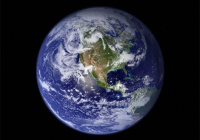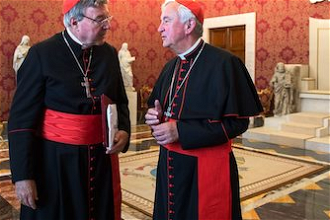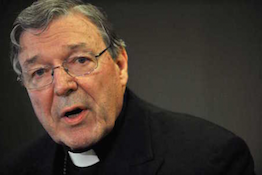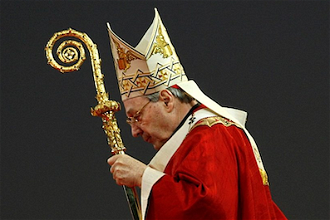The Catholic Church, Climate Change and Cardinal Pell

Given the damage which climate change is causing and will continue to cause to human beings and to the Earth, it is unfortunate that the Vatican has been slow to engage with the climate change debate. In his World Day of Peace Message for 1990, Pope John Paul II wrote a document entitled, Peace With God the Creator, Peace With All Creation.
In No 6 of that document, the Pope wrote: The gradual depletion of the ozone layer and the related 'green-house effect' has now reached crisis proportions as a consequences of industrial growth, massive urban concentrations and vastly increased energy needs… the resulting meteorological and atmospheric changes range from damage to health to possible submersion of low-lying lands.
Despite this very strong statement, the Compendium of the Social Doctrine of the Church, which was published in 2004 by the Pontifical Council for Justice and Peace which prepared the 1990 document, only included a single paragraph on climate change, number 470. Institutional memory, which is normally so strong in the various Vatican Congregations and Councils seems to have collapsed on this very important subject. Worse was to come.
In May 2007, the Pontifical Council for Justice and Peace organised a two-day seminar on climate change. More than 80 people from right around the world attended the seminar. There were excellent presentations from credible scientists whose work had been peer-reviewed. Unfortunately, there were at least four participants who either denied climate change was happened or considered it a good thing. One of these was Professor Craig Idso, adjunct professor at the Office for the Study of Climatology at Arizona State University and Chairman of the Center for the Study of Carbon Dioxide and Global Change. Together with his father Sherwood and his brother Keith, he co-authored a report entitled, “Enhanced or Impaired? Human Health in a CO2-Enriched World,” which claimed that global warming and an increase in atmospheric CO2 would be beneficial to humanity.
Two months later in July 2007, Monsignor James M Reinert of the Pontifical Council for Justice and Peace could tell Francis X Rocca of religiousnews.com that “we realize that climate change is a fact but we are not going to speak about global warming, or how or why. We’re convinced that we still don’t know.” Many people wondered why there was no specific reference to climate change in Pope Benedict’s social encyclical Caritas in Veritate which was published four months before the UN Climate Change Conference in Copenhagen in November/December 2009.
The document Fate of Mountain Glaciers in the Anthropocene published on May 11, 2011 by the Pontifical Academy of the Sciences, marks a huge breakthrough in the Vatican’s approach to climate change. It states that the warming of the Earth is unequivocal. The working party which produced the report included glaciologists, climate scientists, meteorologists, hydrologists, physicists, chemists, mountaineers and lawyers. The document states that “Human-caused changes in the composition of the air and air quality result in more than two million premature deaths worldwide every year and threatens water and food security - especially among those bottom three billion people.” It stresses that bold action is needed immediately. “We appeal to all nations to develop and implement, without delay, effective and fair policies to reduce the causes and impact of climate change on communities and ecosystems including mountain glaciers and their watersheds, aware that we all live in the same home.” Everyone on the planet has some responsibility to deal with climate change, but those who caused the problem in the first place, by burning large quantities of fossil fuel for the past 150 years, must act first.
The document employs the phraseology of the UN Framework Convention on Climate Change (UNFCCC) which states that “by acting now, in a spirit of common but differentiated responsibility,” we accept our duty to one another and the stewardship of a planet blessed with the gift of life. In the UNFCCC discussions, the US has been vigorously opposed to the phrase “common but differentiated responsibility.” The US wants everyone, especially what are called the emerging economies of China, India, Brazil and South Africa, to bear the same burdens as countries in Europe and North America that have been using fossil fuel for almost two centuries. Their argument is that if the burden sharing is not equal, this will give emerging economies an advantage in attracting industry and boosting their economies at the expense of others.
The Anthropocene
Embedded in the title of the Pontifical Academy of the Sciences’ report is, the claim that the best way to describe what human beings are doing to the planet is to use a geological perspective. The authors use the term ANTHROPOCENE which was coined by the Nobel Laureate, Paul Cruzen, to accurately capture what human activity has done to the planet in the past 200 years.
The first person I heard using this kind of language was Fr Thomas Berry, an American Passionist priest who was one of the first people in the Catholic Church to call attention to the ecological crisis. He argued that the changes which human beings have brought about in the biosphere since the beginning of the industrial revolution in 1750 are of a geological order of magnitude. In just over two centuries, human activity has brought about changes which, at other times in the history of the planet, took millions of years to accomplish. For example, the last time a serious extinction spasm occurred was at the end of the Cretaceous period, 65 million years ago. The Intergovernmental Panel on Climate Change (IPCC) estimates that a 3 degree Celsius rise in average global temperatures could lead to the extinction of between one-third and one-half of all life forms on Earth.
The Vatican document claims that already the Earth has warmed by 0.7 degrees Celsius since 1900 AD. According to the report, the “temperature guardrail for avoiding dangerous anthropogenic interference” is now proposed to be set at 2 degrees Celsius above the pre-industrial level. Many scientists now argue that a 1.5 degree C rise is a safer upper limit. The document ends by calling on nations and individuals to act to stabilise the climate as quickly as possible, to avoid irreversible damage to life on earth.
Cardinal Pell, the Catholic Climate Sceptic
Despite this plea, there are still some prominent climate sceptics in the Catholic Church. The most prominent by far is Cardinal George Pell, the Archbishop of Sydney. In his articles in The Sunday Telegraph and the Catholic Weekly, Cardinal Pell has been dismissing climate change. In a public lecture delivered in the US in February 2006, he said that:
“Some of the hysterical and extreme claims about global warming are also a symptom of pagan emptiness, of Western fear when confronted by the immense and basically uncontrollable forces of nature. Belief in a benign God who is master of the universe has a steadying psychological effect, although it is no guarantee of Utopia, no guarantee that the continuing climate and geographic changes will be benign. In the past pagans sacrificed animals and even humans in vain attempts to placate capricious and cruel gods. Today they demand a reduction in carbon dioxide emissions.”
In early 2011, Dr Greg Ayers, head of the Bureau of Meteorology in Australia painstakingly examined the scientific claims which Cardinal Pell made in a letter written and tabled at a Senate hearing. Critics of Cardinal Pell point out that his climate scepticism is based on the work of a geologist called Ian Plimer. But Plimer’s data has been thoroughly debunked by Professor Ian Enting who is a mathematician at the University of Melbourne and also by one of Plimer’s own colleagues, Professor Barry Brook. Instead of responding to Dr. Greg Ayers’ critique of his arguments, Pell accuses Ayers of being a “hot-air specialist” even though Ayers has 140 peer-reviewed articles to his name and Pell does not have even peer-reviewed scientific paper.
When confronted with the findings of the Pontifical Academy of the Sciences in May 2011, Cardinal Pell said he would study the document carefully. Cardinal Pell is correct when he says that the document Fate of Mountain Glaciers in the Anthropocene does not necessarily represent the Vatican’s position on climate change. But, he and many others senior ecclesiastics seem to be unaware that the Vatican has a very clear policy on climate change. It is contained in a joint communique released following a working dinner on September 17th 2010 at Lancaster House between British government representatives and the delegation of the Holy See. It states:
Her Majesty’s Government hosted a dinner on 17 September 2010 for the Holy See delegation accompanying Pope Benedict XVI on his official visit to the UK, headed by Cardinal Secretary of State Tarcisio Bertone. The UK side was headed by William Hague, the Foreign Secretary. Those present included a number of senior British government ministers and senior officials from the Holy See. The discussion covered a range of areas of shared interest between the UK government and the Holy See.
Paragraph 2 of the joint communiqué states that:
‘The British Government and the Holy See share a conviction of the urgent need for action to address the challenge of climate change. Action is needed at every level from the governmental to the individual if we are to rapidly reduce greenhouse gas emissions, to set in motion the transition to a global low-carbon economy, and to assist poor and vulnerable countries to adapt to the impacts of climate change that are already inevitable.’
Unfortunately, this document received very little media attention during Pope Benedict’s visit to Britain, and is little known even in the Church.
It is against this background that the October 26th 2011 lecture by Cardinal Pell as a guest of the Nigel Lawson’s Global Warming Policy Foundation (GWPF) must be judged. The lecture is scheduled to be held at Westminster Cathedral Hall. Cardinal Pell claims that he is only speaking for himself, but given that he is the Archbishop of Sydney, people will naturally think that he is speaking for a segment within the Catholic Church. If the data in the Pontifical Academy’s document is correct and the position of the Holy See so clear, then one has the right to ask those in charge of Westminister Cathedral Hall, why they are giving a platform to Cardinal Pell? If someone asked for the Hall to give a lecture promoting contraception, I am sure that the request would be denied.
The executives of petrochemical companies must be rubbing their hands with glee that a prominent Cardinal in the Catholic Church, is spreading their erroneous and horrendously damaging message. It is particularly reprehensible to host such a talk one month before the UN Framework Conference on Climate Change in Durban, South Africa. This is the make or break conference for climate change. If agreement is not reached, the Kyoto Protocol on carbon emissions will expire and there will be no international agreement limiting greenhouse gas emission. This will inevitably lead to a catastrophe, especially for the poor, not just those living today but for all future generations.
Cardinal Pell must know the role that big business has played in the past and continues to play in trying to undermine the public acceptance of human-induced climate change. Anti-climate change think-tanks such as the Atlas Economic Research Foundation, American Enterprise Institute, Cato Institute, Committee for a Constructive Tomorrow, Competitive Enterprise Institute, Heritage Foundation, Heartland Institute, George C. Marshall Institute in the US and the International Public Policy Network in the UK have received hundreds of thousands of pounds from petrochemical companies such as ExxonMobile. Other corporations involved in promoting scepticism about climate change are Peabody Coal, American Petroleum Institute, Western Fuels Association and Edison Electric Institute.
Planting Seeds of Doubt
In the 1980s and early 1990s, the industries I have listed above and the right wing think-tanks and some governments such as the US during the tenure of President George W Bush, denied that climate change was happening and tried to derail the UN Framework Conference on Climate Change from taking collective action on this most important issue. That outright denial strategy is no longer tenable, so in recent times they are attempting to raise serious doubts in the mind of the public. By promoting climate skepticism they know that governments will not be able to implement the massive changes which will be necessary to wean the public away from using fossil fuel. Many of the national and international policies aimed at reducing greenhouse gas emissions will be painful, but the consequences of not taking action will be more painful within a short few decades.
Benny Peiser, director of Global Warming Policy Foundation which is sponsoring Cardinal Pell’s lecture has decline to reveal the funding sources for the Foundation. He claims that the Foundation does not receive funding “from people with links to energy companies or from the companies themselves".
Cardinal Pell is also completely out of step with his fellow Catholic Bishops in Australia. In 2005, Catholic Earthcare Australia produced a document entitled Climate Change: Our Responsibility to Sustain God’s Earth. This document was endorsed by Archbishop John Bathersly of Brisbane, Archbishop Adrian Doyle, Bishop Christopher Toohey, Bishop Christopher Saunders, Bishop Eugene Hurley and Bishop Patrick Power. The first line in the introduction to the document states that, “ Rapid climate change as a result of human activity is now recognised by the global scientific community as a reality.” The document continues, “a wise response to [global warming] will address both the human causes of accelerated global warming and develop a strategy to manage the future development of our society. Given the gravity of the problem, detailed and resolute responses need to be both swift and radical.” Obviously Cardinal Pell does not share this perspective. He can dismiss the findings of this document and its recommendations.
Given the almost apocalyptic nature of the crisis facing humanity and the rest of creation if the average global temperature rises by 3 or 4 degrees Celsius, the Vatican has an obligation to rein-in Cardinal Pell, before he does any more damage to the reputation of the Catholic Church among the scientific community and concerned Catholics.
Sean McDonagh is an Irish Columban Missionary who worked in the Philippines for two decades. He has written nine books on environmental issues, including Biodiversity and Climate Change.


















